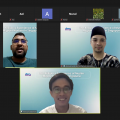RIMA Brief – March 2022
Sunni-Shia Marriages In Singapore: Challenges And Commonalities
Speakers: Syed Imad Alatas
Key Takeaways
1. Sunni-Shia marriages provide a window for understanding intrafaith sensitivities and ways in which couples negotiate an environment that is intolerant to ambivalence and diversity.
2. Marriage also acts as an informal education for Sunni members of a family who are not familiar with Shi’ism that collectively mobilises families to move beyond popular imagery of Shias.
3. There are three factors that can help to facilitate a harmonious Sunni-Shia marriage. First is incorporating a strong set of shared values system that averts dogmatism and embraces differences. Second is adopting a Socratic-like parenting style that guides the intellectual curiosity of a child to discover both traditions objectively. Third is advancing an eclectic educational system that promotes the diversity of the Islamic tradition and accentuates the positive aspects of Sunni-Shia relations in Islamic history.
4. Historically, anti-Shia attitudes are foreign to the region as Shias have played a formative role in constructing Muslim institutions and nation-building in Singapore.
5. Moderating Sunni-Shia discourses in Singapore is a shared responsibility involving both the state and civil society. Interventions should be committed to building bridges and creating an environment that facilitate peaceful mutual relations between Sunnis and Shias.
Summary
The available literature on Sunni-Shia relations tends to focus on the politics and history of sectarianism, particularly in the Middle East. Against this backdrop, Imad’s study aims to broaden the discourse by focusing on the lived realities of Sunni-Shia marriages (‘Sushi’) in Singapore that deserve equal attention. The study intends to provide an alternative narrative that outlines the positive aspects of Sunni-Shia relations which are often overlooked and politicised. Although the interactions between Sunnis and Shias in Singapore are not as hostile as in Malaysia, Imad highlighted that the lived experiences of the four couples he interviewed show the subtle existence of a sectarian ecosystem in Singapore, both in the digital and physical spheres. Interestingly, despite the pervasiveness of anti-Shia sentiments, the couples did not allow their different worldviews to collide mainly because of shared values which helped to facilitate a harmonious marriage despite their differences.
Unity in Diversity
The first value which Imad highlighted is honesty. All of the interlocutors that he interviewed strongly believe that their union should begin with honesty and respect. Certainly, these values could apply to any marriage, but they are unquestionably more relevant in a sensitive union. Therefore, the marriage should not be out of convenience; instead, it should be based on the intellectual curiosity to learn about each other’s traditions without infringing upon the sensitivities. Imad gave the example of a mutual agreement between Fatimah and Hussein who accept both the Shia and Sunni interpretations of Ahl Bayt (People of the Prophet’s house) even though they might disagree about the members in the household. In this regard, the union would transcend the sectarian polemics that have largely coloured Sunni-Shia relations and reflect the moral imperatives of Islam to retain its universal values amid diverging intrafaith traditions. Imad also underlined the importance of extending this honesty to the extended family as marriage is also a union between two families. According to Imad, having these honest conversations do not mean that the differences would subside, but it makes it easier for the families to deal with them by demystifying pre-conceived notions on the religious ‘other’. Imad also cited the example of Fatimah’s mother, who had the impression that the food which Shias prepare is not legally permissible (halal) for consumption. Hussein dealt with this confusion without imposing his views on her, and his openness to engage successfully reduced her anxieties. This approach aligns with the Quranic concept of dialogue that seeks to clarify misunderstandings and deepen the knowledge on Islam through the ‘other’. It is essential to recognise that the goal of dialogue is not to eliminate differences rather, serves as a passageway for respect and dignity. These qualities are important in building the foundations of an interfaith union. Furthermore, marriage could be a form of informal education for both parties to familiarise themselves with their traditions and transcend popular imagery, particularly of the Shias by the Sunnis in Singapore.
Inquisitive Minds
Another contentious issue that Imad highlighted was the children of ‘Sushi’ marriages. Due to the differences in their beliefs, there were instances in which the children were put under the spotlight in schools, particularly religious institutions, as their beliefs are regarded as inimical to the mainstream Sunni way. In view of this, couples had to make compromises and raise their children based on strategies that build their self-confidence and critical thinking skills. When asked about these strategies, Imad shared that a healthy mix of inquisitive young minds and proper guidance from the parents would help mould a stable ‘Sushi’ family. This means that parents have to familiarise the children with both traditions not only in the ritualistic aspects but also in the beliefs and political history of both factions. It is also crucial for parents to focus on the positive descriptions of Sunni-Shia relations in Islamic history that are unfortunately overshadowed by sensationalised imageries such as self-flagellation during Ashura to commemorate the death of Imam Hussain. Although parents would naturally express their hopes for the children to follow their respective traditions, they would not impose their beliefs on them and trust their decisions when they are older. To the parents, the awareness of both traditions is more important than adherence to a particular tradition. Imad added that the willingness to learn about their parents’ traditions was crucial in countering prejudices. This healthy curiosity is pertinent in an age where misinformation is widespread due to the Internet and lack of education on Shi’ism in Singapore.
Deep learning on Muslim diversity
It is clear from the above deliberations that education plays a vital role in humanising and normalising Sunni-Shia relations in Singapore. Imad maintained that marriage is a form of informal education on Shi’ism, particularly for the Sunni family members to move beyond the stereotypes constructed by popular media. Imad highlighted some of the grievances of the couples, especially how many are not exposed to the different schools of thought within Sunni and Shia traditions from an early age that retrospectively could have prevented a ‘Sushi’ union from blossoming in Singapore. Imad suggested the need for Islamic education centres, particularly madrasahs, to promote an eclectic educational pedagogy that informs students on the diversity of the Islamic tradition and not just the mainstream Sunni tradition. It entails objectively understanding the beliefs of Shias and their historical presence in Singapore. This would create an environment that does not force Shias to be invisible and to be treated equally despite their differences.
Anti-Shia Sentiments a foreign Import
The prevalence of anti-Shia attitudes in Singapore is not native to the region as traditionally Shias were and have been part of the Malay world dominated mainly by Sunni Muslims. Imad cited the formation of the Islamic Religious Council of Singapore (MUIS) through the cooperation of both Sunnis and Shias. He identified the Iranian Revolution in 1979 as the turning point that changed the narrative of Shi’ism in the region. Prior to the revolution, Sunni-Shia interactions in Singapore were not contentious. However, after the revolution, the visibility of a polemical Shia discourse became more prevalent to the extent that Shi’ism is now regarded as a ‘new’ belief to some Sunni Muslims in Singapore. Imad argued that this exclusionary attitude shows an ignorance of historical realities that Shias have played a prominent role in the formation of Islam and the development of Muslims in Singapore.
Moderator’s role a shared responsibility
While much has been said about how Singapore successfully manages its diversity which is crucial in a multi-religious population, more efforts are needed to regulate the internal fissures of the Muslim community that could potentially harm Singapore’s social fabric. Although MUIS officially recognises Shias as part of the Muslim community, more could be done to counter anti-Shia rhetoric in the digital sphere, such as those promoted by the Facebook group Melayu Singapura Tolak Syiah. Community stakeholders have to equally shoulder the responsibility and not leave it to the state to manage. Community-led initiatives, such as the intrafaith iftar organised by MCollective Singapore during Ramadan would be an excellent opportunity to build bridges and create an intellectual habitus conducive to peaceful mutual relations between Sunnis and Shias.
Future Areas of Research
Imad concluded the discussion by suggesting the need to study the lived experiences of ‘Sushi’ children and the generational differences in how Sunni-Shia relations were talked about and approached. Even though living as ‘Sushi’ children in Singapore might not be as perilous as living in Malaysia, the exposure of anti-Shia rhetoric on social media platforms and its impact on these children, most of whom are digital natives, is worth studying. Imad also suggested a content analysis of the syllabi in madrasahs to understand how Sunni-Shia relations in Singapore are taught in these institutions. It is also worth engaging with the available counter-discourses to anti-Shia rhetoric in Singapore and parallelly evaluating the responses by anti-Shia groups.
About the Speaker
Syed Imad Alatas is currently pursuing his PhD in Sociology at the University of North Carolina-Chapel Hill, United States. His research interests include the sociology of religion, gender, and youth. His Master’s thesis at the National University of Singapore focused on female Muslim NGOs in Malaysia and their discourses on women’s roles and gender relations. Prior to commencing his Master’s studies, he worked at the Middle East Institute in NUS, where he oversaw the institute’s publications and was in charge of the internship programme.
He has written on anti-Semitism in Malaysia and Indonesia and adolescent masculinities for the Asia Pacific Social Science Review and the Southeast Asian Social Science Review, respectively. Imad also has published a chapter on interfaith harmony in Budi Kritik, a collection of essays on intellectual life, religion, ethnic identity, and political activity of Malays in Singapore. Outside academia, he has written for Malaysian online publications such as Free Malaysia Today and the Malay Mail.
Click on the link to download the RIMA brief – Sunni-Shia Marriages in Singapore: Challenges And Commonalities
Photo by Megapixelstock from Pexels











